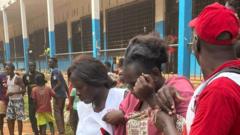Nigerian students face debilitating challenges during exams, with a staggering drop in pass rates, leading to serious consequences for individuals and calls for accountability.
Nigeria's University Entrance Exams Hit by Technical Blunders and a Tragic Incident

Nigeria's University Entrance Exams Hit by Technical Blunders and a Tragic Incident
Widespread outrage erupts as technical failures leave students devastated during critical university entrance exams.
Blank questions, power interruptions, and a heartbreaking suicide have overshadowed Nigeria's recent Unified Tertiary Matriculation Examination (UTME), as the Joint Admissions and Matriculation Board (JAMB) openly addressed significant technical issues that marred this year's testing process. Nearly 80% of test-takers scored below the 50% threshold typically required for university admission, sparking a wave of anger and concern among students, parents, and advocates.
The unfortunate situation escalated when 19-year-old Faith Opesusi Timileyin took her own life after failing to achieve a passing score in her second attempt at the exams. Her distraught family revealed she scored only 146 out of 400, down from 193 the previous year—a significant drop that they attribute to the overwhelming pressure created by the exam's mishaps.
Many students expressed their encounters with the technical glitches throughout the process. Favour Eke, a candidate who struggled with the exam’s online format, reported that ten of the questions simply did not appear on her screen. This left her with an agonizing choice: to skip those questions after being directed to omit them, resulting in a loss of valuable concentration. She is now uncertain about her chances for university admission, marking her third attempt.
Others reported similar issues, including difficulties logging in, unexpected profile switches, and system shutdowns that infringed upon their ability to complete the tests. These failures are especially alarming given that JAMB historically holds a stringent stance on exam integrity.
In light of the unprecedented criticism, JAMB's registrar, Ishaq Oloyede, tearfully apologized during a press conference, acknowledging the "painful damage" caused and announcing that approximately 380,000 students from 157 affected centers would be allowed to retake their exams. The organization attributed the glitches to a failure in the computer system while also emphasizing the need to maintain the academic integrity of the evaluation process.
The examination board's decision to grant retakes has been met with some skepticism. With opposition figures like Peter Obi speaking out against systemic failures in critical institutions and rights activists labeling the incident as "educational sabotage," the call for accountability remains pronounced in the public discourse.
As Nigerian society grapples with the fallout from these exams, the focus now shifts to ensuring reliable and fair assessment processes that safeguard the futures of its youth.
The unfortunate situation escalated when 19-year-old Faith Opesusi Timileyin took her own life after failing to achieve a passing score in her second attempt at the exams. Her distraught family revealed she scored only 146 out of 400, down from 193 the previous year—a significant drop that they attribute to the overwhelming pressure created by the exam's mishaps.
Many students expressed their encounters with the technical glitches throughout the process. Favour Eke, a candidate who struggled with the exam’s online format, reported that ten of the questions simply did not appear on her screen. This left her with an agonizing choice: to skip those questions after being directed to omit them, resulting in a loss of valuable concentration. She is now uncertain about her chances for university admission, marking her third attempt.
Others reported similar issues, including difficulties logging in, unexpected profile switches, and system shutdowns that infringed upon their ability to complete the tests. These failures are especially alarming given that JAMB historically holds a stringent stance on exam integrity.
In light of the unprecedented criticism, JAMB's registrar, Ishaq Oloyede, tearfully apologized during a press conference, acknowledging the "painful damage" caused and announcing that approximately 380,000 students from 157 affected centers would be allowed to retake their exams. The organization attributed the glitches to a failure in the computer system while also emphasizing the need to maintain the academic integrity of the evaluation process.
The examination board's decision to grant retakes has been met with some skepticism. With opposition figures like Peter Obi speaking out against systemic failures in critical institutions and rights activists labeling the incident as "educational sabotage," the call for accountability remains pronounced in the public discourse.
As Nigerian society grapples with the fallout from these exams, the focus now shifts to ensuring reliable and fair assessment processes that safeguard the futures of its youth.



















